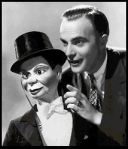ANCIENT TIMES

Ventriloquism started long, long ago in a land far, far away.
Seriously, it did.
The Greeks built a temple at Delphi in the sixth century B.C. and the earliest record of ventriloquism being used
was at this temple. Greek oracles spoke for Apollo through his priestess Pythia. Pythia would stand as if in a trance, mouth still, as words came
from the sky or out of a sacred stone--a relatively easy deception for a ventriloquist. The Greeks called it "gastromancy," referring to the
use of the diaphram to project a voice without moving the lips.
This is why some people today think ventriloquism is creepy, in addition to being unnerved by seeing an inanimate object talk.
As for the origin of the word "ventriloquism," it's a blending of two Latin words: "Ventre" (the belly) and "Loqui" (to speak)--so ventriloquists were originally known as "belly speakers."
TODAY
Vaudeville became a way for performers to show their talents. Some ventriloquists had multiple dummies on stage,
or made voices seem to come from objects or beneath the stage floor, and even live animals.
In America, ventriloquism spread from the stages of Vaudeville to the new media of radio, television, and film. The most successful and beloved
ventriloquist in America was Edgar Bergen (1903-1978) and his sidekick, "Charlie McCarthy."
When David Letterman announced he was sponsoring a "Ventriloquist Week" in September, many applauded it as a way to showcase the best talent performing today in America. The top vents appearing included Willie Tyler, Jay Johnson, Ronn Lucas, Jeff Dunham, and Todd Oliver. For more, click here.
"Never trust a ventriloquist or a Barber."
~ W. C. Fields
Edgar Bergen and
Charlie McCarthy



